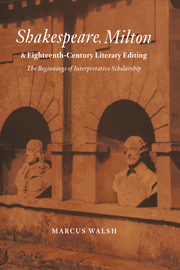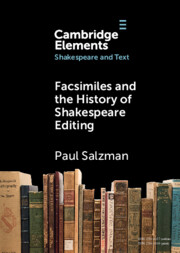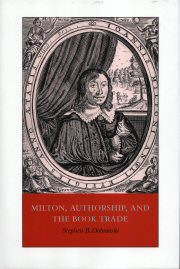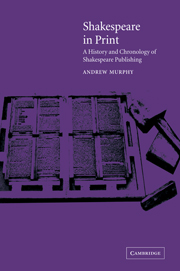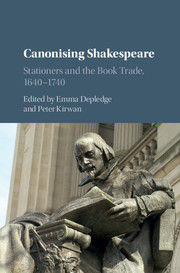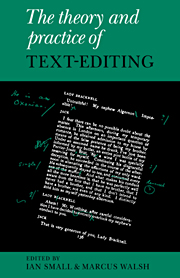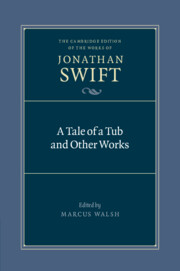Shakespeare, Milton and Eighteenth-Century Literary Editing
The Beginnings of Interpretative Scholarship
Part of Cambridge Studies in Eighteenth-Century English Literature and Thought
- Author: Marcus Walsh, University of Birmingham
- Date Published: September 1997
- availability: Available
- format: Hardback
- isbn: 9780521554435
Hardback
Other available formats:
Paperback
Looking for an inspection copy?
Please email [email protected] to enquire about an inspection copy of this book
-
The first developments in the editing of English literary texts in the eighteenth century were remarkable and important, and they have recently begun to attract considerable interest, particularly in relation to conditions and constructions of scholarship in the period. This study sets out to investigate, rather, the theoretical and interpretative bases of eighteenth-century literary editing. Extended chapters on Shakespearean and Miltonic commentary and editing demonstrate that the work of pioneering editors and commentators, such as Patrick Hume, Lewis Theobald, Zachary Pearce, and Edward Capell, was based on developed, sophisticated and often clearly articulated theories and methods of textual understanding and explanation. Marcus Walsh relates these interpretative theories and methods to seventeenth- and eighteenth-century Anglican biblical hermeneutics, and to a number of key debates in modern editorial theory.
Read more- Comprehensive exploration of key phase of development of literary editing
- Considers both Shakespeare and Milton editing in contemporary context
- Emphasises development of theory and methodology of interpretation, and relates this to modern editorial theory
Reviews & endorsements
' … a very intelligent, very detailed book, aimed primarily at scholars interested in theories of textual editing, in general eighteenth-century intellectual history, or in the textual history of Milton and Shakespeare's works … exceptionally well researched and clearly presented work.' Candler Sheffield Rogers, Shakespeare Quarterly
See more reviews'In an extremely interesting essay on Shakespeare and philosophy, Philip Smallwood examines the relationship of Shakespeare to eighteenth-century (and even twentieth-century) philosophy.' Jaquelyn W. Walsh, Ideas, Aesthetics, and Inquiries in the Early Modern Era
Customer reviews
Not yet reviewed
Be the first to review
Review was not posted due to profanity
×Product details
- Date Published: September 1997
- format: Hardback
- isbn: 9780521554435
- length: 240 pages
- dimensions: 229 x 152 x 17 mm
- weight: 0.52kg
- contains: 12 b/w illus.
- availability: Available
Table of Contents
Introduction
1. Some theoretical perspectives for the study of eighteenth-century editing
2. Making sense of Scripture: biblical hermeneutics in seventeenth- and eighteenth-century England
3. Making sense of Milton: the editing of Paradise Lost
4. Making sense of Shakespeare: editing from Pope to Capell
5. Conclusion
Select bibliography.
Sorry, this resource is locked
Please register or sign in to request access. If you are having problems accessing these resources please email [email protected]
Register Sign in» Proceed
You are now leaving the Cambridge University Press website. Your eBook purchase and download will be completed by our partner www.ebooks.com. Please see the permission section of the www.ebooks.com catalogue page for details of the print & copy limits on our eBooks.
Continue ×Are you sure you want to delete your account?
This cannot be undone.
Thank you for your feedback which will help us improve our service.
If you requested a response, we will make sure to get back to you shortly.
×
